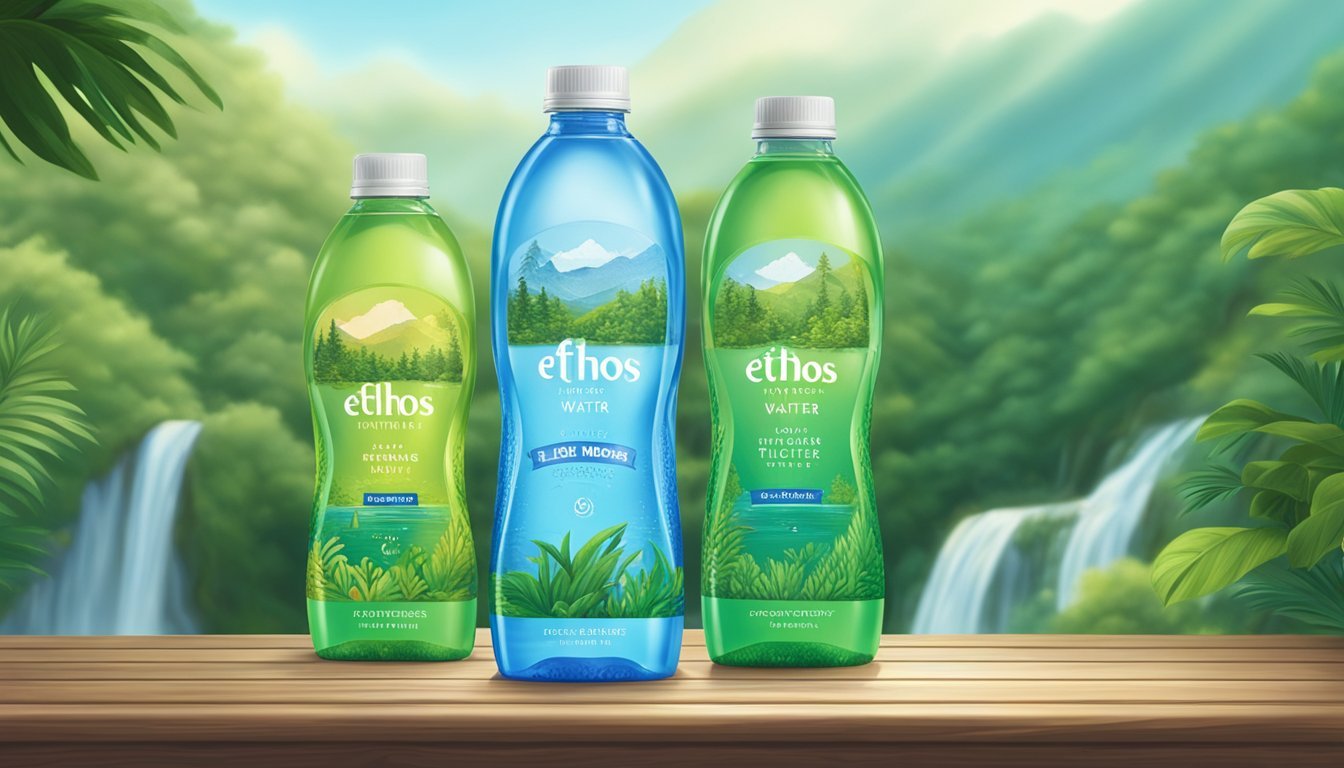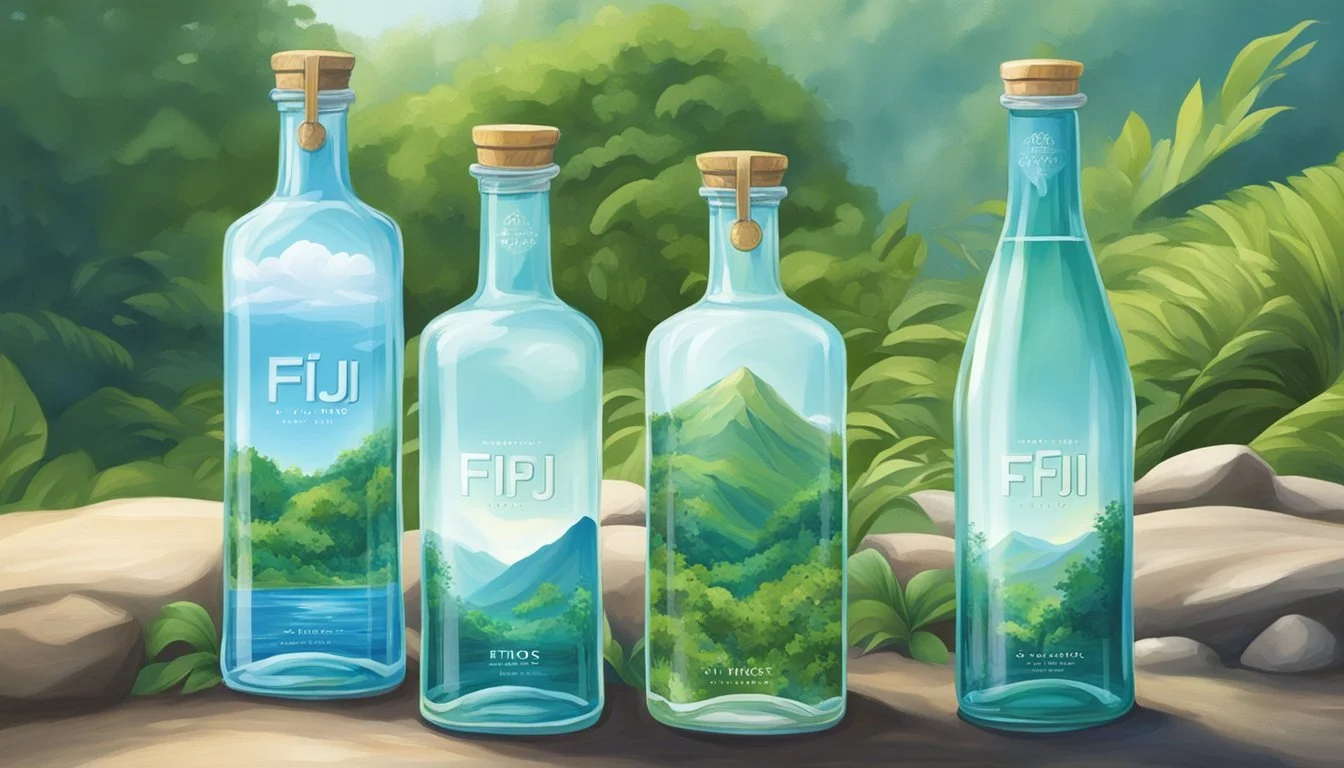Ethos vs. Fiji
Comparing Quality and Taste in Bottled Water Brands
The bottled water market presents a vast array of options for consumers, with numerous brands competing on factors such as taste, purity, and social responsibility. Among these brands, Ethos Water and Fiji Water have emerged as popular choices, yet they cater to different segments of the market and espouse distinct brand philosophies. Ethos Water appeals to the socially conscious consumer, pledging to help provide access to clean water in developing countries. Fiji Water, on the other hand, emphasizes its product's unique origin, touting the natural artesian aquifer in the remote Fiji Islands as the source of its water.
As consumers become more health-conscious and environmentally aware, they often scrutinize their choices in bottled water. Ethos Water, packaged in a simple yet elegant design, captures the attention of those who seek to make a positive impact with their purchase. Contrastingly, the exotic appeal of Fiji Water, with its signature square bottle and tropical imagery, speaks to those drawn towards a premium water experience. Both brands have cultivated a loyal customer base, and their success is indicative of their ability to connect with specific consumer values and aspirations.
The pursuit of finding the better bottled water between Ethos and Fiji is not just a matter of personal taste, but also involves considering factors such as the environmental footprint, the social impact of the purchase, and the overall quality of the water itself. Despite Fiji's status as a top contender in the realm of premium bottled water, Ethos has carved out a niche for itself by combining product sales with charitable endeavors. These aspects are critical for consumers to weigh, and as such, the comparison between Ethos and Fiji Water becomes a reflection of what each individual deems important in their choice of hydration.
History and Origin of Brands
The tales behind Ethos Water and Fiji Water reflect the brands' distinct identities: one crafted on altruistic principles and partnership with a coffee giant, the other evolving from a tropical island resource into a globally recognized premium bottled water brand.
Ethos Water: Philanthropy and Starbucks Partnership
Ethos Water started with an ambition to help children get access to clean water. Founded in 2003, its mission revolved around a socially conscious ethos, contributing a portion of each sale to water-related humanitarian projects. In 2005, Starbucks acquired Ethos Water, scaling up its philanthropic impact. Starbucks continues to sell Ethos Water in its stores, maintaining the brand's commitment to global water initiatives.
Fiji Water: Tropical Source and Brand Evolution
Fiji Water, sourced from an underground aquifer in Fiji's Yaqara Valley, is naturally filtered through volcanic rock which adds to its mineral profile and taste. Launched in 1996, the brand leverages its exotic origin and purity of the water to market itself as a luxury product. Fiji Water has grown considerably since its inception, becoming a flagship in prestige bottled water across the United States and beyond.
Water Sourcing and Environmental Impact
The sourcing of bottled water and its environmental impact are significant factors when comparing Ethos and Fiji. The methods of extraction and contributions to sustainability efforts vary between brands and are critical considerations for consumers.
Ethos Water: Sourcing and Sustainability Efforts
Ethos Water sources its product from multiple locations, including public water sources. They emphasize environmentally-friendly practices and pledge to help children gain access to clean water. A portion of sales revenue goes towards this initiative. However, as Ethos is typically packaged in single-use plastic bottles, environmental scrutiny persists concerning the use of plastics and the overall sustainability of such a practice.
Fiji Water: Extraction from Natural Artesian Aquifer
Fiji Water is extracted directly from an aquifer in Fiji, the Yaqara aquifer to be precise, an underground reservoir shielded by volcanic rock which naturally filters the water. The brand prides itself on its artesian source, claiming minimal human contact and pure water as a result. Yet, the extraction of groundwater can have an impact on local ecosystems, and the long-distance transportation of Fiji Water, packaged in single-use plastic bottles, contributes to a larger environmental impact. Moreover, local communities' needs juxtapose the company's export operations, prompting discussions regarding the balance of economic benefits against environmental stewardship.
Purity and Quality of Water
When comparing Ethos and Fiji bottled waters, it is vital to examine the purity and quality of the water they provide. This examination involves looking into their filtration processes, the presence of contaminants, and the unique properties that each brand claims to offer.
Ethos Water: Purity Standards and Filtration
Ethos Water prides itself on providing water that meets high purity standards. Their water undergoes a comprehensive filtration process which includes reverse osmosis. This advanced filtration technique is effective at removing a wide array of contaminants, including heavy metals and other impurities that can affect the taste and safety of water. The result is a bottle of purified water that Ethos presents as both clean and safe for consumption.
Fiji Water: Silica Content and Natural Filtration
Fiji Water, on the other hand, is known for its unique mineral profile and natural filtration process. The water is sourced from an aquifer at the edge of a Fijian volcano and is naturally filtered through volcanic rock. During this process, the water accumulates minerals and electrolytes, including a significant amount of silica, which is believed to provide health benefits. Fiji advertises its water as having a high level of purity due to the natural filtration that also imbues it with a distinct taste and feel.
Packaging and Branding Strategies
In the battle of bottled water brands, Ethos and Fiji have carved out distinct niches through their packaging and branding strategies. Consumers are often drawn to the visual appeal and brand ethos that resonate with their personal values or sense of convenience.
Ethos Water: Marketing and Brand Message
Ethos Water projects its brand message through simple yet impactful packaging. It primarily uses plastic water bottles that are designed to be both convenient and environmentally conscious. Ethos emphasizes its commitment to social causes, with a portion of its profits supporting water, sanitation, and hygiene education programs in developing countries. This commitment is reflected in the brand’s packaging choices, which aim to balance functionality with a pledge to make a positive social impact.
Packaging Material: Predominantly plastic, considering recycled materials
Branding Focus: The social mission is front and center on labels
Consumer Appeal: Aligns with socially conscious consumers
Fiji Water: Iconic Square Bottle and Image
Fiji Water, on the other hand, is easily recognized by its iconic square bottle design which is made from plastic. The distinctive bottle not only stands out on shelves but also reflects Fiji Water's premium branding approach. Establishing itself as a luxury water choice, Fiji's packaging strategy involves aligning its exotic image with upscale environments such as high-end hotels and luxury venues. Fiji Water’s new label design highlights the beauty and the story behind the brand, enhancing the visual aesthetics and appeal of the product.
Bottle Shape: Unique square silhouette that distinguishes it on shelves
Material: Use of plastic, with consideration for environmental impact
Brand Image: Exporting the tropical allure of Fiji through packaging design
Both Ethos and Fiji have successfully utilized their packaging and branding strategies to appeal to different market segments, with a clear focus on their respective brand messages – Ethos with its commitment to humanitarian causes and Fiji with its luxurious and exotic brand image.
Health and Hydration
When discussing the health benefits of bottled water brands like Ethos and Fiji, it is essential to address not only their hydration capabilities but also their mineral content, as both factors significantly impact the body's overall health and function.
Benefits of Proper Hydration
Proper hydration is vital for maintaining bodily functions and supporting overall health. It aids in digestion, circulation, absorption and even excretion. Both Ethos and Fiji water brands provide the necessary fluid to sustain these bodily functions. Hydration from these sources helps maintain electrolyte balance, which is essential for nerve and muscle function.
Comparison of Mineral Content
The mineral content in bottled water can differ depending on the source and treatment process. Minerals such as calcium and magnesium are important electrolytes found in both Ethos and Fiji water. These electrolytes are critical in regulating hydration, nerve impulses, muscle contractions, and metabolism.
Fiji water is sourced from an artesian aquifer in Fiji and is known for its high silica content, which is believed to offer health benefits such as stronger bones and improved digestion. The pH level of Fiji water is alkaline, which some proponents believe can help neutralize acid in the bloodstream and is beneficial for those with acid reflux.
On the other hand, Ethos water, while also contributing to hydration, does not market itself based on a unique mineral composition. However, it contributes to hydration needs and contains minerals typical of other purified bottled waters.
Both brands contribute to hydration, but Fiji water’s distinct alkaline quality and its specific mineral content might entice consumers looking for those particular attributes. However, it is important to remember that adequate hydration can be effectively achieved with a variety of water sources, and choosing between Ethos and Fiji may come down to personal preference regarding taste and commitment to environmental sustainability.
Consumer Experience and Taste Profile
Comparing Ethos and Fiji bottled waters, consumers often report distinct differences in taste and the practicality of the packaging. These factors significantly influence consumer preferences.
Flavor: Ethos vs. Fiji Water
Ethos Water is characterized by its clean and clear taste, with a goal of providing water that appeals to a broad audience. Its taste is often described as neutral, without a pronounced mineral flavor. This brand is not typically highlighted for a unique taste profile but is instead focused on its charitable mission to support water access initiatives globally.
On the other hand, Fiji Water is recognized for its soft, smooth, and almost silky taste on the palate. Hailed from the Fiji Islands, its notable taste derives from natural minerals, particularly silica, which contributes to Fiji Water’s distinctive smooth, and crisp profile. Consumers often describe the taste of Fiji Water as fresh and pure.
Packaging Convenience and Usability
When it comes to packaging, Ethos Water offers standard, portable bottles which are convenient for on-the-go hydration. However, they are made from single-use plastic, which raises concerns among environmentally conscious consumers.
Fiji Water stands out with its iconic square-shaped bottle, which not only distinguishes it visually but is also designed to optimize shelf space. While the aesthetic is notable, some consumers find that the shape can affect the convenience in certain situations, such as car cup holders. Despite this, the bottle's design is often seen as a factor of Fiji’s brand experience. Like Ethos, Fiji uses single-use plastic, which is a point of contention for those considering the environmental impact of their purchase.
Comparative Analysis of Industry Standards
The purity and safety of bottled water are governed by industry standards and regulations, which ensure consumer health and product quality. Both Ethos Water and Fiji Water are subject to these guidelines, which include compliance with FDA regulations and adherence to international quality standards.
Ethos Water Compliance with FDA
Ethos Water, a subsidiary of Starbucks, aligns with FDA regulations which oversee bottled water in the United States. The FDA enforces standards for bottled water based on the Environmental Protection Agency's (EPA) guidelines for tap water. This entails routine disinfection and contaminant testing to avoid harmful bacteria and chemicals in the water.
Quality Control Measures: Ethos Water is required to monitor the levels of contaminants. Regular testing must show compliance with the following limits:
Microbiological Purity: No presence of coliform bacteria.
Chemical Quality: Certain chemicals like lead and mercury must be below established maximum levels.
Fiji Water and International Quality Regulations
Fiji Water is sourced from an aquifer in the Fiji Islands and thus must adhere not only to U.S. FDA regulations, but also international quality standards to maintain its market globally. They assure quality through Blutriton, a sophisticated filtration process, which promises clean and mineral-rich water.
International Standards Adherence: Fiji Water has maintained a good reputation partly by complying with stringent international regulations, which encompass the following focal points:
Consistency in Quality: Ensuring every bottle meets the same quality standards.
Environmental Responsibility: They emphasize sustainability in water sourcing.
Both brands demonstrate a commitment to meeting and often exceeding the standard expectations for bottled water, rooted in a robust framework of regulations designed to safeguard consumer health and safety.
Market Presence and Consumer Preference
In the competitive bottled water industry, market presence and consumer preferences distinguish brands. Ethos Water and Fiji Water have unique positioning and strategies that influence their consumer base and distribution channels.
Sales and Distribution: Ethos vs. Fiji
Ethos Water, aligned with its philanthropic mission, is widely recognized and distributed mainly through Starbucks locations, given that Coca-Cola owns a minority stake in the brand. Ethos’s market presence benefits from Starbucks' extensive global reach, which promotes its sales and reputation.
In contrast, Fiji Water has a strong market presence characterized by its exotic origin and unique mineral profile. The Wonderful Company’s brand is available in various retail outlets, restaurants, and hotels, signifying a broad distribution approach. Internationally, Fiji’s presence extends across multiple continents, indicating a substantial global distribution network. Fiji Water's impressive sales figures are indicative of its strong market presence, where it stood out with the highest net favorability among U.S. adults in a Morning Consult survey, surpassing other contenders such as PepsiCo Inc.’s Aquafina.
Public Perception and Social Responsibility
The public's perception of a water brand can be influenced by the company's commitment to social responsibility. Ethos Water sets itself apart with its significant focus on ethical initiatives, as a portion of its sale proceeds go towards global water crisis projects. This social entrepreneurial approach resonates positively among consumers who value corporate responsibility.
Fiji Water, on the other hand, is often associated with luxury and purity, emanating from its tropical origin and marketing efforts. The brand’s reputation is bolstered by consumer perceptions of its superiority in taste and quality. Yet, ethical concerns regarding its environmental impact and the juxtaposition of sourcing water from a region with its own water access issues occasionally stir public discourse.
Both brands leverage their unique propositions to nurture their market presence and sway consumer preference. Ethos aligns itself with socially conscious consumers through Coca-Cola's distribution model, while Fiji Water captures those seeking premium bottled water, touted for its origin and taste.
Final Verdict: Ethos and Fiji Water Comparison
When comparing Ethos and Fiji water, consumers often consider several factors, including taste, source, environmental impact, and corporate social responsibility. Ethos Water brands itself with a philanthropic angle, contributing a portion of its profits to water fund programs that help children get access to clean water.
Fiji Water, on the other hand, is known for its source—aquifers in the Fiji Islands, where the water is naturally filtered through volcanic rocks. This gives it a unique mineral profile and a pH level of about 7.7, which can contribute to its taste being perceived as smoother by some consumers.
Aspect Ethos Water Fiji Water Source Varied Fiji Islands pH Level Not widely marketed ~7.7 Charitable Aspect Contributions to clean water initiatives Not a primary focus
Ethos Water does not prominently advertise its pH level, which can be a consideration for those looking for alkaline water. In terms of packaging, both brands use plastic bottles, a choice that carries environmental considerations.
The choice between Ethos and Fiji may come down to personal preference and values. Ethos Water's charitable mission may appeal to socially conscious consumers, while Fiji Water’s natural mineral content and taste might be favored by those looking for a more premium hydration experience. Neither brand is universally "best," as both offer distinct benefits that can cater to differing consumer priorities.








